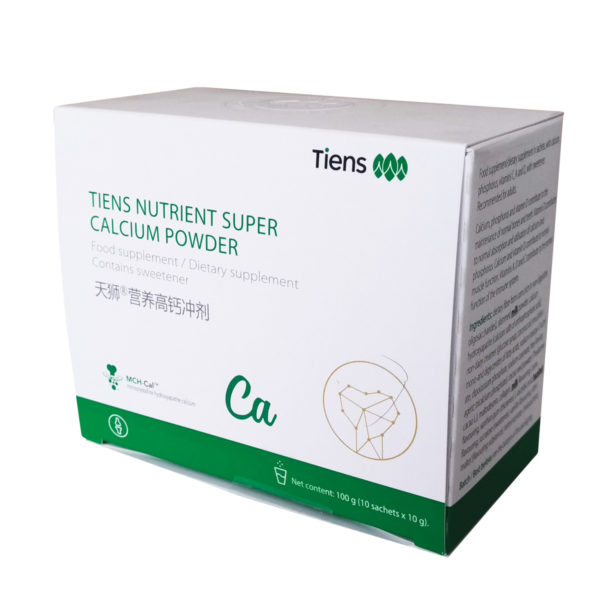
Calcium is one of the most crucial chemical element that builds and regulates our body. It is responsible for the maintenance of healthy bones and teeth. The proper concentration of this element ensures normal blood clotting and s foster proper muscle function and neurotransmission. We get recommended amounts of calcium from the food we eat. Sometimes, to avoid calcium deficiencies, a diet supplement should be considered.
DESCRIPTION
Calcium is a chemical element essential for life. It is responsible for many functions of our body, for example, the normal function of digestive enzymes and blood clotting. It also ensures normal muscle function and the proper functioning of the nervous system. Above all, calcium is an essential building block for bones and teeth. The more of the element is provided to our body in childhood and adolescence, the greater the chance we will have for a stronger, so-called peak bone mass, which is achieved roughly around 30 years of age. Between the age 30 and 50 it is stable, then begins to decrease. Calcium helps to reduce the loss of bone mineral in post-menopausal women. Low bone mineral density is a risk factor for osteoporotic bone fractures. However, this process can start earlier, since up to 99% of calcium is deposited in the bones and only 1% in the tissues. The body itself tries to maintain proper calcium levels. However, when calcium intake is inadequate, the calcium begins to be released from bones and this means bones decalcification. Calcium deficiency inhibits maintenance of bone and teeth. An adult human requires about 1,000 mg of calcium per day. However, the demand for calcium varies with age and also depends on the gender. Children and adolescents during intensive growth, pregnant and breastfeeding women as well as menopausal women and older people need more calcium. Meanwhile, with food, we provide from 400 to 800 mg of calcium per day, mainly with milk, cheese, yoghurt and other dairy products. Also, fish are a rich source of calcium. In addition, the absorption of calcium may be reduced by drinking too much tea, coffee, alcohol, and consuming components of many products, e.g. phytic acid contained in cereals and legumes, oxalates, insoluble fibre fractions, the oversupply of phosphorus. A diet rich in sugar, fats and table salt also reduces the absorption of calcium. In the case of risk of calcium deficiency, in addition to a proper diet, supplementation is thus required. TIENS has created a series of calcium supplements, fitted to different needs of the body. Nutrient Super Calcium Powder is a universal product containing calcium and a set of vitamins. Each of the TIENS calcium supplements contains organic ionised calcium, well absorbed by the body (approximately 95%).
COMPOSITION
The preparation contains easily assimilable, ionised calcium compounds derived from calf bones. It is worth remembering that calcium is naturally found in the ionic form. Upon entry into the body, it is converted to a molecular form (an insoluble calcium salt). Such a molecule cannot enter the cell, because only for ions can get across the cell membrane. Thus, it is better to use supplements containing ionised calcium, not calcium carbonate (derived from oyster shells, for instance), which is less digestible and may neutralise gastric juices. Vitamins help the body absorb calcium, hence their presence in the preparation. Vitamin D contributes to normal absorption of calcium and phosphate in the body, which means the amount of calcium and phosphorus, absorbed in the intestine from food into the bloodstream, depends to a great extent on this vitamin. Vitamin D deficiency reduces calcium absorption, even when the diet is rich in this micro-element. This may finally result in bone demineralisation. Additionally, vitamin D contributes to the normal function of the immune system, hence its deficiency increases the risk of infection. An additional ingredient contained in the product - vitamin C - contributes to the protection of cells from oxidative stress, it means that protecting against free radicals. In addition – vitamin C contributes to normal collagen formation for the normal function of blood vessels, bones, skin, teeth, cartilage and gums. TIENS preparation also contains vitamin A. Vitamin A contributes to the normal function of the immune system and has a role in the process of cell specialization (it means that the cell belongs to a specific tissue and adapts to perform a specific function), whereas iron contributes to the normal function of the immune system.
ACTION
The product compounds exhibit a broad spectrum of activity:
RECOMMENDED DAILY PORTION
Dissolve ½-1 sachet in 100 ml of water at about 40ºC. The supplement should be taken at 30 minutes before food, once a day, preferably in the afternoon.
NOTE
The preparation should not be used by children under 12 years. In case a doctor prescribes an antibiotic, inform them of taking calcium, as this may decrease antibiotic absorption.
Excess calcium is equally disadvantageous as its deficiency. Calcium supplementation should be consulted with the doctor, as for instance in patients suffering from kidney stones, excessive calcium intake may increase kidney stone formation. Excess calcium may also limit the absorption of other minerals such as zinc, magnesium, iron or fluorine. It is hence recommended to keep a three-hour break between supplements containing these elements.